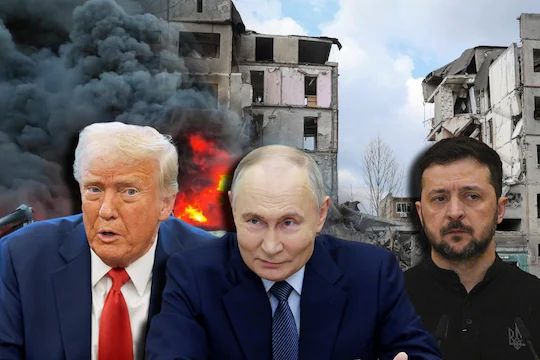ڈیوڈ رش نے اپنے دوست کے ساتھ 7.5 سیکنڈ میں 10 غبارے پھوڑ کر نئے ریکارڈ پر نظریں جما لیں
Nuq4 Latest Questions
-
ویسٹ انڈیز کے جزیرے باربدوس میں دنیا کا سب سے چھوٹا انوکھا سانپ 20 برس بعد دوبارہ دریافت کر لیا گیا۔
ویسٹ انڈیز کے جزیرے باربدوس میں دنیا کا سب سے چھوٹا انوکھا سانپ 20 برس بعد دوبارہ دریافت کر لیا گیا۔
See less- Share
-
انگریز نے جب ہندوستان میں اپنے قدم جما لیے اور حکمران بن بیٹھا تو چونکہ وہ اپنے دوست اور دیگر رشتے دار پیچھے چھوڑ آیا تھا تو یہ ثابت کرنے کےلیے کہ وہ بھی سماجی حیوان ہے، اس نے ہندوستان میں جم خانے اور کلب بنائے تاکہ وہ اپنے ہم رنگ، ہم نسل، ہم منصب، ہم نوالہ، ہم پیالہ کے ساتھ وقت گزار سکے اور سماجی سRead more
انگریز نے جب ہندوستان میں اپنے قدم جما لیے اور حکمران بن بیٹھا تو چونکہ وہ اپنے دوست اور دیگر رشتے دار پیچھے چھوڑ آیا تھا تو یہ ثابت کرنے کےلیے کہ وہ بھی سماجی حیوان ہے، اس نے ہندوستان میں جم خانے اور کلب بنائے تاکہ وہ اپنے ہم رنگ، ہم نسل، ہم منصب، ہم نوالہ، ہم پیالہ کے ساتھ وقت گزار سکے اور سماجی سرگرمیاں کرسکے۔ اس کو صرف اپنے لوگوں تک محدود کرنے کےلیے اس نے باہر بورڈ لگوا دیے کہ ’’کتوں اور ہندوستانیوں‘‘ کا داخلہ ممنوع ہے۔
انگریز چلے گئے، قوم آزاد ہوگئی اور جم خانوں اور کلبوں سے بورڈ اتر گئے۔ لیکن میرا خیال ہے کہ یہ بورڈ آج بھی آویزاں ہیں بس نظر نہں آتے۔ کیونکہ آج بھی صرف ایک مخصوص سماجی حیثیت کے لوگ ہی ان جم خانوں اور کلبوں میں جلوہ گر ہوتے ہیں اور دلچسپ بات یہ ہے کہ اگر ان کے رشتے دار خاص طور پر وہ جو سماجی حیثیت میں اُن کے ہم پلہ نہ ہوں، اگر وہ ان سے ملنے کے خواستگار ہوں تو یہ انکار کر دیتے ہیں کہ ہم مصروف ہیں اور کلب جارہے ہیں۔ اس صورتحال میں نوٹس تو اب بھی موجود ہے لیکن اب وہ مقامی ضروریات پوری کرتے ہیں۔
جیسا کہ ہم سب جانتے ہے کہ انسان ایک سماجی حیوان ہے اور اس میں سے سماجی نکال دوں تو صرف حیوان رہ جاتا ہے۔ انسان کی سماجی ضروریات کو پورا کرنے کےلیے ہر دور میں کچھ نہ کچھ نئی چیزیں اور طریقے متعارف کرائے جاتے رہے۔ موجودہ دور سماجی ذرائع ابلاغ کا ہے، بدقسمتی سے اس سماجی ذرائع ابلاغ نے ملاقات کے معنی بدل دیے ہیں۔ اب ملنا بھی آن لائن ہوگیا ہے کہ جس کے نتیجے میں ملاقات تو آن لائن ہوجاتی ہے لیکن موت تنہائی یا اکیلے میں ہوتی ہے۔
جس تواتر سے اس قسم کے واقعات میں اضافہ ہورہا ہے لگتا ہے کہ قوم جلد ہی اس کو بھی قبول کرلے گی اور ابھی جو تھوڑا بہت اثر ہم دیکھ رہے ہیں وہ بھی وقت کے ساتھ ختم ہوجائے گا اور ہم بالکل احساس سے عاری لوگوں کا ہجوم بنے ہوئے تو ہیں ہی بس یہ سب کچھ اور پکا ہوجائے گا۔ جب بھی کوئی نئی چیز یا طریقہ متعارف کرایا گیا تو یہ خیال رکھا گیا کہ نئی چیز یا طریقہ انسان کے تابع ہوں۔ یہ پہلی بار ہے کہ انسان اس سوشل میڈیا کا عادی بلکہ ’’غلام‘‘ بن گیا ہے۔ بے شمار ایسی تصاویر اور ویڈیوز موجود ہیں کہ جس میں ہم نے دیکھا کہ لوگ اس قدر سوشل میڈیا پر منہمک تھے کہ حادثے کا شکار ہوگئے لیکن کوئی سبق سیکھنے کو تیار نہیں۔
ہمارا مذہب ہمیں یہ بتاتا ہے کہ تم اگر کچھ اچھا کھاتے یا پیتے ہو لیکن کسی بھی وجہ سے اسے اپنے ہمسایے کے ساتھ بانٹ نہیں سکتے تو اس کی باقیات کو باہر مت پھینکو کہ تمہارے ہمسایے کو اپنی کم مائیگی کا احساس نہ ہو۔ لیکن آج سوشل میڈیا پر کیا ہو رہا ہے، ہر چھوٹی سے چھوٹی چیز کی نمائش کی جاتی ہے، جیسے میں پیزا کھا رہا ہوں، میں نے حلوہ پوری کھائی اور دیگر چیزوں میں کہ میں طیران گاہ سے ملکی اور غیر ملکی سفر پر روانہ ہورہا ہوں اور لوگ کھانے کی چیزوں پر yummy اور دیگر چیزوں پر مختلف تاثرات دیتے ہیں۔ ایک اور طریقہ “like” کا ہے جس میں مختلف اشکال بھی ہیں، جیسے دل یا انگوٹھا۔ اگر فیس بک کا بٹن دلی کیفیت بتا سکتا تو دل کے ساتھ ’’چھریاں‘‘ بھی ہوتیں اور ’’انگوٹھے‘‘ کے ساتھ بقایا انگلیاں بھی ہوتیں، باقی آپ سب سمجھدار ہیں۔
خدا کےلیے ہوش کے ناخن لیجیے۔ یہ موجودہ دور کا فتنہ ہے۔ ہر دور کے اپنے فتنے ہوتے ہیں اور اگر ان فتنوں کا وقت پر سدِباب نہیں کیا گیا تو یہ قوموں کو تباہ کردیتے ہیں اور قرآن میں اس قسم کے واقعات کی بہت مثالیں ہے۔ انتہا تو یہ کہ میں نے مسجد میں داخلے کے (check in) کے پیغامات بھی پڑھے ہیں۔ اگر یہ خدا کےلیے ہے تو کیا اس کو پتہ نہیں ہے؟ ہمارا تو ایمان ہے کہ وہ دلوں کے حال جانتا ہے اور اگر لوگوں کےلیے ہیں تو پھر اسے دکھاوے کے سوا کیا نام دوں۔
ہم سب جانتے ہیں کہ آخرت میں ہر چیز بشمول ہمارے اپنے اعضا ہمارے اعمال کی گواہی دیں گے، تو کہیں اس فیس بک کے چکر میں ہم کہیں فیس دکھانے کہ لائق نہ رہے اور یہ فیس بک والا like نہیں، آگے اپ کی مرضی اللہ ہم سب کو ہدایت دے۔ آمین۔
آخر میں ہماری قومی ذہنیت پر ایک کہانی اور اختتام۔
ایک گھر کے دروازے پر دستک ہوئی، دروازہ کھولا تو سامنے پیزا ڈلیوری والا لڑکا کھڑا تھا۔ گھر کے مکین نے کہا کہ ہم نے تو کوئی پیزا کا آرڈر نہیں دیا ہے۔ پیزا ڈلیوری والے نے کہا کہ معلوم ہے اور یہ کہہ کر پیزا کا ڈبہ کھول کر انھیں پیزا دکھایا اور کہا کہ یہ آپ کے پڑوسیوں کا آرڈر ہے۔ انھوں نے کہا کہ آپ کو دکھا دوں کیونکہ ان کے یہاں بجلی نہیں ہے اور اس کو فیس بک پر پوسٹ نہ کرسکیں گے۔
آپ پیزا دیکھ کر جل بھن کر کباب بنیں اور چاہے تو پھر وہی جلے بھنے کباب کھا لیجئے گا اور اپنے پڑوسیوں کو پیزا سے لطف اندوز ہونے دیں۔
See less- Share
-
ہماری روزمرہ کی زندگی اور معاشرتی اقدار میں ’’کمالیت پسندی‘‘ یا "Perfectionism" کو اکثر ایک خوبی کے طور پر دیکھا جاتا ہے۔ ایک ایسا شخص جو اپنے ہر کام کو نہایت نفاست، محنت اور بے عیب طریقے سے انجام دینے کی کوشش کرتا ہے، اسے قابلِ تعریف اور کامیابی کی ضمانت سمجھا جاتا ہے۔ اسکول کے ذہین ترین طالب علم سRead more
ہماری روزمرہ کی زندگی اور معاشرتی اقدار میں ’’کمالیت پسندی‘‘ یا “Perfectionism” کو اکثر ایک خوبی کے طور پر دیکھا جاتا ہے۔ ایک ایسا شخص جو اپنے ہر کام کو نہایت نفاست، محنت اور بے عیب طریقے سے انجام دینے کی کوشش کرتا ہے، اسے قابلِ تعریف اور کامیابی کی ضمانت سمجھا جاتا ہے۔ اسکول کے ذہین ترین طالب علم سے لے کر دفتر کے سب سے قابل ملازم تک، کمالیت پسندی کو کامیابی کا زینہ قرار دیا جاتا ہے۔
لیکن کیا ہو اگر کامیابی کی یہ بظاہر چمکتی ہوئی سیڑھی درحقیقت ایک پھسلن بھری ڈھلوان ہو جو انسان کو ذہنی اور نفسیاتی بیماریوں کی گہری کھائی میں دھکیل دے؟ جدید نفسیاتی تحقیقات اور عالمی ماہرین کی آراء اس سکے کا ایک دوسرا، تاریک رُخ پیش کرتی ہیں، جس کے مطابق کمالیت پسندی ایک خوبی سے بڑھ کر ایک سنگین نفسیاتی مرض بھی بن سکتی ہے۔
یہ سمجھنا ضروری ہے کہ ہر قسم کی کمالیت پسندی نقصان دہ نہیں۔ ماہرینِ نفسیات صحت مند (Adaptive) اور غیر صحت مند (Maladaptive) کمالیت پسندی میں واضح فرق کرتے ہیں۔ صحت مند کمالیت پسندی میں انسان اپنی ذات سے بہترین کارکردگی کی توقع رکھتا ہے، محنت کرتا ہے، اور ناکامی کو سیکھنے کا ایک موقع سمجھتا ہے۔ اس کے برعکس، غیر صحت مند کمالیت پسندی ایک جنون کی شکل اختیار کر لیتی ہے جہاں انسان خود سے غیر حقیقی اور ناقابلِ حصول معیار وابستہ کر لیتا ہے۔ یہاں غلطی کی کوئی گنجائش نہیں ہوتی، اور ہر چھوٹی سی خامی بھی ذاتی ناکامی اور بے وقعتی کے شدید احساسات کو جنم دیتی ہے۔ یہی وہ مقام ہے جہاں یہ خوبی ایک مرض کی شکل اختیار کر لیتی ہے۔
نفسیات کے موضوع پر دنیا کی مقبول ترین ویب سائٹ ’’سائیکالوجی ٹوڈے‘‘ (Psychology Today) کا کہنا کہ غیر صحت مند کمالیت پسندی محض ایک بری عادت نہیں، بلکہ یہ کئی ذہنی بیماریوں کی جڑ ہے۔
’’سائیکالوجی ٹوڈے‘‘ کے ایک مضمون بعنوان “The Dangers of Perfectionism” میں بتایا گیا ہے کہ کمالیت پسند افراد اپنی زندگی کو ایک ایسی رپورٹ کارڈ کی طرح دیکھتے ہیں جس میں ہر حال میں ’’A+‘‘ گریڈ حاصل کرنا لازمی ہے۔ اس مضمون میں واضح کیا گیا ہے کہ ’’کمال‘‘ یا “Perfection” حقیقت میں ایک ناممکن الحصول تصور ہے۔ اس کے پیچھے بھاگنے والے افراد شدید ذہنی دباؤ، اضطراب (Anxiety)، ڈپریشن، اور Obsessive-Compulsive Disorder (OCD) جیسی بیماریوں کا شکار ہوجاتے ہیں۔
مضمون کے مطابق کمالیت پسندوں کی سب سے بڑی جنگ کامیابی حاصل کرنا نہیں، بلکہ ناکامی سے بچنا ہوتی ہے۔ ناکامی کا خوف ان پر اس قدر حاوی ہو جاتا ہے کہ وہ اکثر کام شروع ہی نہیں کر پاتے، اس کیفیت کو نفسیات میں “Procrastination” یا ٹال مٹول کی عادت کہا جاتا ہے۔ انہیں ڈر ہوتا ہے کہ اگر وہ کام شروع کریں گے اور اسے پایہ تکمیل تک نہ پہنچا سکے تو یہ ان کی ذات پر ایک بدنما داغ ہوگا۔
ایک اور تجزیے میں، جو “What Is Maladaptive Perfectionism?” میں بتایا گیا ہے کہ اس مرض کی بنیاد اکثر بچپن کے تلخ تجربات، والدین کی بے جا توقعات اور احساسِ کمتری پر ہوتی ہے۔ ایسے افراد اپنی قدر و قیمت کا تعین اپنی کامیابیوں اور کارکردگی کی بنیاد پر کرتے ہیں۔ وہ غیر مشروط محبت پر یقین نہیں رکھتے اور انہیں ہر وقت یہ خوف لاحق رہتا ہے کہ اگر وہ کامل نہیں ہوں گے تو لوگ انہیں قبول نہیں کریں گے۔ اس مضمون میں کمالیت پسندی کی چند واضح علامات کا ذکر کیا گیا ہے، جیسے “All-or-None Thinking” یعنی ’’سب کچھ یا کچھ نہیں‘‘ کی سوچ۔ ان کے لیے کوئی بھی کام یا تو مکمل طور پر بہترین ہوتا ہے یا مکمل طور پر ناکارہ۔ درمیان کا کوئی راستہ نہیں ہوتا۔
عالمی ماہرینِ نفسیات کی مستند آرا
جب ہم کمالیت پسندی پر ہونے والی عالمی تحقیق پر نظر ڈالتے ہیں تو دو نام سب سے نمایاں نظر آتے ہیں: کینیڈا کے ماہرینِ نفسیات ڈاکٹر گورڈن فلیٹ (Dr. Gordon Flett) اور ڈاکٹر پال ہیوٹ (Dr. Paul Hewitt)۔ ان دونوں محققین نے اپنی زندگی کا بڑا حصہ کمالیت پسندی کی نفسیات کو سمجھنے اور اس کے علاج کے طریقے وضع کرنے میں صرف کیا ہے۔
ڈاکٹر فلیٹ، جو کینیڈا کی یارک یونیورسٹی میں نفسیات کے پروفیسر ہیں، اور ڈاکٹر ہیوٹ، جو برٹش کولمبیا یونیورسٹی میں کلینیکل سائیکالوجی کے پروفیسر ہیں، نے اپنی دہائیوں پر محیط تحقیق کے بعد کمالیت پسندی کا ایک کثیر جہتی ماڈل (Multidimensional Model) پیش کیا۔ ان کی مشترکہ تصنیف “Perfectionism: A Relational Approach to Conceptualization, Assessment, and Treatment” کو اس میدان میں ایک سنگِ میل کی حیثیت حاصل ہے۔ ان کے مطابق، کمالیت پسندی کی تین بڑی اقسام ہیں:
* ذات پر مبنی کمالیت پسندی (Self-Oriented Perfectionism): اس میں فرد خود اپنے لیے انتہائی بلند اور غیر حقیقی معیار مقرر کرتا ہے اور انہیں حاصل نہ کر پانے پر شدید خود تنقیدی کا شکار ہوتا ہے۔
* دوسروں پر مبنی کمالیت پسندی (Other-Oriented Perfectionism): اس قسم میں فرد اپنے اردگرد کے لوگوں، جیسے خاندان، دوستوں یا ساتھ کام کرنے والوں سے کامل ہونے کی غیر حقیقی توقعات وابستہ کرتا ہے۔ جب دوسرے اس کے معیار پر پورا نہیں اترتے تو وہ غصے، مایوسی اور رشتوں میں تناؤ کا شکار ہوتا ہے۔
* معاشرتی طور پر مسلط کردہ کمالیت پسندی (Socially Prescribed Perfectionism): ڈاکٹر فلیٹ اور ہیوٹ کے مطابق، یہ کمالیت پسندی کی سب سے خطرناک اور زہریلی قسم ہے۔ اس میں فرد یہ سمجھتا ہے کہ معاشرہ، یا اس کے اردگرد کے اہم لوگ اس سے کامل ہونے کی توقع رکھتے ہیں اور وہ ان توقعات کو پورا کرنے کے لیے شدید دباؤ محسوس کرتا ہے۔ اسے ہر وقت یہ خوف رہتا ہے کہ اگر اس سے کوئی غلطی ہوئی تو اسے شدید تنقید، مسترد کیے جانے یا سماجی بے وقعتی کا سامنا کرنا پڑے گا۔ اپنی تحقیق میں ڈاکٹر فلیٹ نے واضح طور پر کہا ہے کہ ’’معاشرتی طور پر مسلط کردہ کمالیت پسندی کا تعلق براہِ راست ناامیدی، ڈپریشن اور یہاں تک کہ خودکشی کے خیالات سے پایا گیا ہے۔‘‘
امریکن سائیکولوجیکل ایسوسی ایشن (APA) کے ایک پوڈکاسٹ انٹرویو میں، ڈاکٹر گورڈن فلیٹ نے اس بات پر زور دیا کہ ’’کمالیت پسند افراد کامیابی سے لطف اندوز نہیں ہوپاتے، کیونکہ جیسے ہی وہ ایک ہدف حاصل کرتے ہیں، وہ فوراً اگلے، اس سے بھی زیادہ مشکل ہدف کی طرف دیکھنے لگتے ہیں۔ وہ کبھی بھی اپنی کامیابی پر مطمئن نہیں ہوتے اور ایک مستقل بے چینی کی حالت میں رہتے ہیں۔‘‘
کمالیت پسندی کے جسمانی اور ذہنی اثرات
جب ذہن مسلسل ’’کامل‘‘ ہونے کی جنگ میں مبتلا ہو تو اس کے اثرات صرف نفسیات تک محدود نہیں رہتے بلکہ جسم پر بھی ظاہر ہونا شروع ہوجاتے ہیں۔
* دائمی ذہنی دباؤ (Chronic Stress): ہر وقت بہترین کارکردگی دکھانے کا دباؤ جسم میں کورٹیسول (Cortisol) جیسے اسٹریس ہارمونز کی سطح کو بلند رکھتا ہے، جس سے بلڈ پریشر اور دل کی بیماریوں کا خطرہ بڑھ جاتا ہے۔
* اضطراب اور ڈپریشن: ناکامی کا خوف اور مسلسل خود تنقیدی اضطراب کی کیفیات کو جنم دیتی ہے اور جب انسان اپنے غیر حقیقی معیار پر پورا نہیں اتر پاتا تو وہ شدید مایوسی اور ڈپریشن کا شکار ہو جاتا ہے۔
* بے خوابی (Insomnia): کمالیت پسند افراد اکثر راتوں کو اپنی غلطیوں اور ناکامیوں کے بارے میں سوچتے رہتے ہیں، جس کی وجہ سے ان کی نیند بری طرح متاثر ہوتی ہے۔
* سماجی تنہائی: دوسروں سے غیر حقیقی توقعات اور اپنی ذات میں ہر وقت نقص نکالنے کی عادت انہیں سماجی طور پر الگ تھلگ کر دیتی ہے۔ وہ رشتوں میں بھی کمال تلاش کرتے ہیں جو کہ ناممکن ہے، اور نتیجتاً تنہا رہ جاتے ہیں۔
اس قید سے رہائی کیسے ممکن ہے؟
اگر آپ خود میں یا اپنے کسی پیارے میں غیر صحت مند کمالیت پسندی کی علامات پاتے ہیں تو یہ سمجھنا ضروری ہے کہ یہ کوئی ناقابلِ علاج مرض نہیں۔ چند ٹھوس اقدامات اور سوچ میں تبدیلی سے اس کے شکنجے سے آزاد ہوا جا سکتا ہے:
* حقیقت پسندانہ اہداف مقرر کریں: اپنے لیے قابلِ حصول اہداف مقرر کریں۔ سمجھیں کہ انسان ہونے کے ناتے غلطیاں اور خامیاں زندگی کا حصہ ہیں۔
* خود پر رحم کریں (Self-Compassion): ناکامی پر خود کو کوسنے کے بجائے خود سے ہمدردی برتیں۔ اپنی کوشش کو سراہیں۔
* عمل پر توجہ دیں، نتیجے پر نہیں: اپنی توجہ صرف حتمی نتیجے کے بجائے کام کے عمل سے لطف اندوز ہونے پر مرکوز کریں۔
* غلطیوں کو سیکھنے کا موقع سمجھیں: ہر غلطی ایک سبق ہے۔ اسے اپنی بے وقعتی کا ثبوت سمجھنے کے بجائے مستقبل میں بہتر ہونے کا ایک ذریعہ سمجھیں۔
* ماہرانہ مدد حاصل کریں: اگر یہ کیفیت آپ کی روزمرہ زندگی، کام اور رشتوں کو بری طرح متاثر کر رہی ہے تو کسی ماہرِ نفسیات یا کاؤنسلر سے رابطہ کرنے میں ہچکچاہٹ محسوس نہ کریں۔ کوگنیٹو بیہیویورل تھراپی (CBT) جیسی تکنیکس اس مرض پر قابو پانے میں انتہائی مؤثر ثابت ہوئی ہیں۔
بلاشبہ، بہتری کی جستجو اور اپنے کام میں نفاست پیدا کرنا ایک مثبت عمل ہے، لیکن جب ’’بہترین‘‘ کی تلاش ’’کامل‘‘ ہونے کے جنون میں بدل جائے اور انسان کی ذہنی سکون اور خوشی کو نگلنے لگے، تو یہ لمحہ فکریہ ہے۔ زندگی نام ہی نامکمل ہونے کا ہے اور اس کی خوبصورتی اسی میں ہے کہ ہم اپنی خامیوں کو قبول کر کے آگے بڑھیں۔ کامل ہونے کی کوشش میں ایک بے چین اور ناخوش انسان بننے سے کہیں بہتر ہے کہ ایک خوش اور مطمئن ’’نامکمل‘‘ انسان بن کر جیا جائے۔
نوٹ: ایکسپریس نیوز اور اس کی پالیسی کا اس بلاگر کے خیالات سے متفق ہونا ضروری نہیں۔
See lessاگر آپ بھی ہمارے لیے اردو بلاگ لکھنا چاہتے ہیں تو قلم اٹھائیے اور 800 سے 1,200 الفاظ پر مشتمل تحریر اپنی تصویر، مکمل نام، فون نمبر، فیس بک اور ٹوئٹر آئی ڈیز اور اپنے مختصر مگر جامع تعارف کے ساتھ [email protected] پر ای میل کردیجیے۔
- Share
-
IND vs PAK Asia Cup 2025:ٹیم انڈیا کے سابق کپتان سورو گانگولی نے ایشیا کپ 2025 کی حمایت کی ہے۔ان کے بیان پرملک بھر میں ناراضگی ہے۔ پہلگام دہشت گرد حملے کا زخم ابھی ہرا ہے اور ہندوستانی کرکٹ ٹیم پاکستان کے ساتھ کرکٹ میچ کھیلنے کے لیے تیار ہوگئی ہے۔ متحدہ عرب امارات میں ہونے والے ایشیا کپ میں انڈیا اوRead more
IND vs PAK Asia Cup 2025:ٹیم انڈیا کے سابق کپتان سورو گانگولی نے ایشیا کپ 2025 کی حمایت کی ہے۔ان کے بیان پرملک بھر میں ناراضگی ہے۔
پہلگام دہشت گرد حملے کا زخم ابھی ہرا ہے اور ہندوستانی کرکٹ ٹیم پاکستان کے ساتھ کرکٹ میچ کھیلنے کے لیے تیار ہوگئی ہے۔ متحدہ عرب امارات میں ہونے والے ایشیا کپ میں
انڈیا اورپاکستان کے بیچ 14 ستمبر کومقابلہ ہوگا۔ اس میچ کے حوالے سےسوشل میڈیا پر لوگوں کا غصہ ابل رہا ہے۔ادھر ٹیم انڈیا کے سابق کپتان سورو گانگولی کے تازہ بیان نے آگ میں گھی ڈالنے کا کام کیا ہے۔
See less
سورو گانگولی کا کہنا ہے کہ انہیں ایشیا کپ پر کوئی اعتراض نہیں ہے، کھیل چلتے رہنا چاہیے۔ساتھ ہی انھوں نے یہ بھی کہا کہ پہلگام جیسا واقعہ نہیں ہونا چاہیے۔دہشت گردی نہیں ہونی چاہیے۔دہشت گردی کو روکنا ہوگا۔بھارت نے دہشت گردی کے خلاف سخت موقف اختیار کیا ہے لیکن کھیل جاری رہنا چاہیے- Share
-
Russia Ukraine war: اگر پوتن نے 10-12 دن میں نہ مانی بات، ٹرمپ کی ڈیڈ لائن
Russia Ukraine war: اگر پوتن نے 10-12 دن میں نہ مانی بات، ٹرمپ کی ڈیڈ لائن
See less- Share
-
’آہان پانڈے سیارہ کے لیے 100 کروڑ فیس کے مستحق ہیں
’آہان پانڈے سیارہ کے لیے 100 کروڑ فیس کے مستحق ہیں
See less- Share









چاروں کھلاڑی روانگی کیلئے منگل کو کراچی میں جمع ہوں گے
چاروں کھلاڑی روانگی کیلئے منگل کو کراچی میں جمع ہوں گے